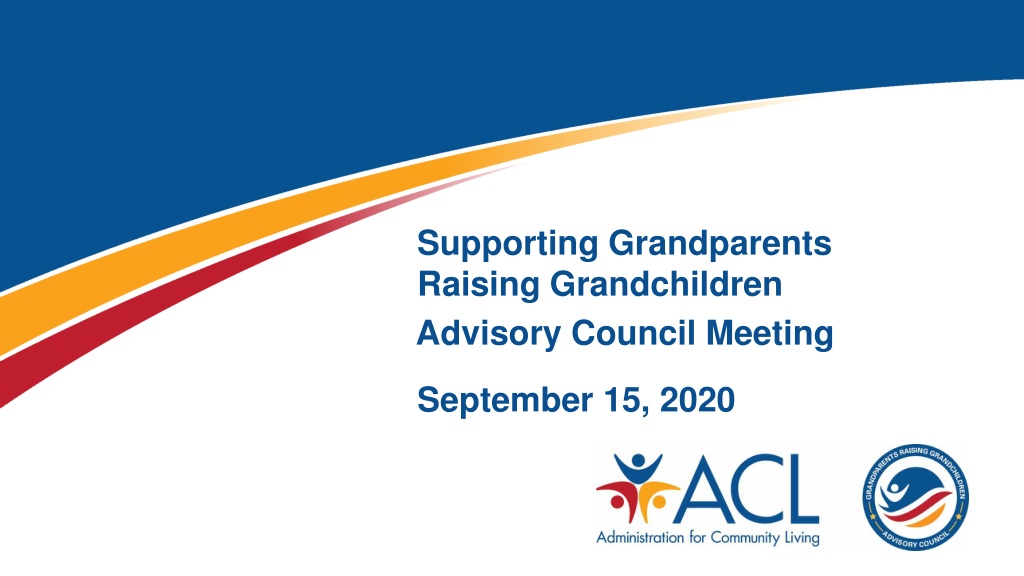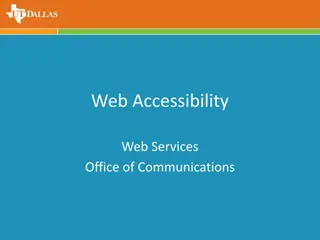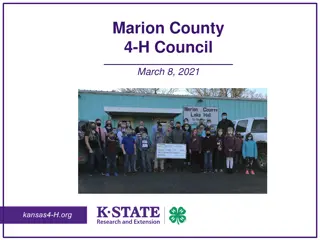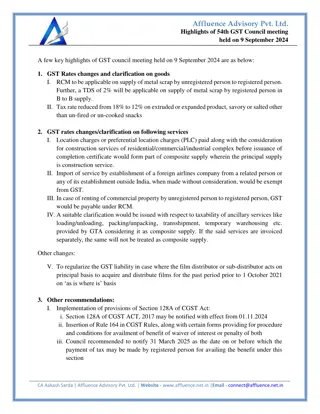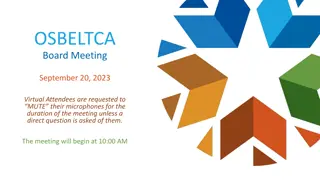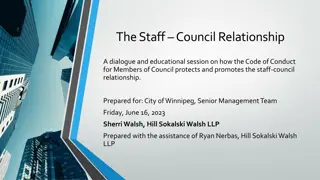Supporting Grandparents Raising Grandchildren Advisory Council Meeting Summary
The Supporting Grandparents Raising Grandchildren Advisory Council Meeting on September 15, 2020, included significant discussions led by key individuals such as Lance Robertson, Administrator/Assistant Secretary for Aging, and Lori Stalbaum from the Administration for Community Living. The meeting covered important topics like the SGRG Request for Information Analysis, Report to Congress recommendations, and focused on identifying issues and trends facing grand and kinship families. The purpose was to provide recommendations and resources to support these families and establish a framework to support caregivers effectively.
- Grandparent support
- Advisory council meeting
- Kinship families
- Caregiver resources
- Report to Congress
Download Presentation

Please find below an Image/Link to download the presentation.
The content on the website is provided AS IS for your information and personal use only. It may not be sold, licensed, or shared on other websites without obtaining consent from the author. Download presentation by click this link. If you encounter any issues during the download, it is possible that the publisher has removed the file from their server.
E N D
Presentation Transcript
Supporting Grandparents Raising Grandchildren Advisory Council Meeting September 15, 2020
Call to Order Lance Robertson Administrator/Assistant Secretary for Aging Administration for Community Living
A Message from the HHS Secretary Secretary Alex Azar U.S. Department of Health and Human Services
Council Chair Opening Remarks Lance Robertson Administrator/Assistant Secretary for Aging Administration for Community Living
Agenda Overview Lori Stalbaum Office of Supportive and Caregiver Services Administration for Community Living
Agenda Overview and ACL Updates 1:00-1:40 SGRG Request for Information (RFI) Analysis Findings 1:40-3:20 Report to Congress: Recommendations Discussion 3:20-3:30 Wrap Up & Next Steps
SGRG Request for Information (RFI) Analysis Wilma Brockington-Parker, MBA, SPHR, PCC
RFI Analysis Purpose and Outcomes Identify issues and trends facing grand and kinship families from various sources including but not limited to: Public and private stakeholders and entities, Tribal organizations, and Individuals and families impacted by the opioid crisis Identify key takeaways to be included to the initial Report to Congress as required by the Supporting Grandparents Raising Grandchildren Act of 2018.
RFI Analysis Purpose and Outcomes (cont.) Provide recommendations and resources to support grand and kinship families Provide a framework for the Advisory Council to manage and take meaningful actions/activities to support grand and kinship families and other caregivers. Focus on solutions
Acknowledgements Respondents to the Request for Information The SGRG Advisory Council Special thanks to: Amelia Karraker, Ph.D Beverley Yang Carmen Sanchez Charlotte Stephenson Gail Engel Michael Herndon Sonya Begay
Analysis Report Limitations Limited demographic data (not specifically requested as a part of the RFI) Request for information was pre-COVID-19 Use of acronyms for organizations and benefits (some challenging to identify) In some cases, no specific breakdown to identify the type of respondent
Responses Response Categories # of Responses Percentages Meet the mental/physical health, educational or nutritional needs of those for whom they provide care 254 13.3% Address other concerns such as legal assistance, financial support and affordable housing associated with this population of caregivers and care recipients Maintain their own physical and mental health, and emotional and financial wellbeing Grand families/Kinship families affected by the opioid epidemic or other substance misuse. This could include issues experienced by children who were exposed prenatally to alcohol or drugs, as well as family issues associated with substance abuse. Native American tribes 242 12.7% 230 12% 204 11% 90 5% Grandparents and other older relatives who are raising or supporting grandchildren 268 14%
Responses (cont.) Response Catergories # of Responses Percentages Children in the care of a grandparent and/or older relative 196 10% Do you think additional federal legislation is needed to better support and serve grandparents and older relatives raising children? Please describe. Please share any additional recommendations you have for supporting grandparents and older relatives caring for children? TOTALS 250 13% 174 9% 1,908 100%
Respondent Categories 0.98% 0.98% 0.33% 1.63% Respondent Categories Numbers Percentages Grandparents Community Organizations, Government Agencies Unidentified Kinship Caregivers Attorneys Non-Relative Caregivers Foster Caregivers TOTALS 146 47.56% 17.26% 47.56% 96 53 5 3 3 1 307 31.27% 17.26% 1.63% 0.98% 0.98% 0.33% 100.00% 31.27% Grandparents Community Organizations, Government Agencies Unidentified Kinship Caregivers Attorneys Non-Relative Caregivers Foster Caregivers
Primary Issues and Themes Health, safety, and what is best for the children Unprepared for financial pressures and consequences (i.e., housing, legal, medical, employment opportunities, childcare) Managing physical and mental health issues Gatekeeper between biological parents and the children
Primary Issues and Themes (cont.) Not having appropriate, affordable and/or supportive advocacy Issues are multifaceted, variable and intertwined They don t know what they don t know (i.e., resources, advocacy, financial support)
Areas of Concern for Respondents Issues and Examples Frequency Percentages Finances (fixed income, additional expenses, insurance costs, unable to work) Legislation/Laws (laws more favorable to biological parents, child benefits not transferrable) Legal Assistance (high costs, expensive adoption process accessibility) Schools/Education (special needs not adequately addressed, lack of school system support) Addictions (cycle of drug usage, resources for biological parents, impact on children) Housing (affordability, limited space, repairs/ maintenance, children not accepted at 55+ communities, custody orders preventing relocation,) 581 20.91% 289 10.40% 271 9.76% 266 9.58% 241 8.68% 215 7.74%
Areas of Concern for Respondents (cont.) Issues Frequency Percentages 213 195 156 145 Food/Nutrition (costs, nutritional value, special diets) Childcare (high costs) Respite (affordability, availability, quality) Physical Health (disabilities children and caregivers) Mental/Emotional Health (stress, loss of social relationships, child trauma, separation, lack of support, grief) Medical/Health (caregivers place their health after children, lack of self-care, children s medical issues) TOTALS 7.67% 7.02% 5.62% 5.22% 105 3.78% 101 2,778 3.64% 100.00%
Roadblocks to Obtaining Support Age limitations for support (i.e., 60+) Statute language not correlating with federal law giving caregivers the right to be heard in hearings concerning children/lack of compliance with federal laws Challenging/difficult for caregivers to comply with licensing requirements for foster families Lack of food stamps, child only public assistance, Medicaid, school breakfast/lunch
Roadblocks to Obtaining Support (cont.) If custody is not relinquished to the state, there is no support benefits/services Affordability special needs childcare Inconsistencies in support can vary by location Long waiting periods for assistance (i.e., 7 years)
Roadblocks to Obtaining Support (contd) Lack of or challenging to find information about available resources (they don t know what they don t know--resources, advocacy, financial support) Lapse in medical coverage--delays in getting counseling Not feeling advocated for by state agencies Lack of knowledge about the new generation
In Their Own WordsFinancial Concerns I don't qualify for any support, but I need assistance, and guidance to create a job that would allow me to make money and be able to make my own schedule to take care of the child. I believe I'm capable of doing it. However, I need financial support. I've done research to try to get financial assistance and I got no where. They also told me we don't qualify for food stamps, which I don't understand because I'm taking care of my grandson and I'm disabled, and my husband is 63 and disabled.
In Their Own WordsFinancial Concerns (cont.) I am desperate for help. I receive $271 for TANF, and $308 food assistance each month. That is it. I have two chronic and at times, debilitating autoimmune disorders that limit my earning potential, greatly, not to mention issues with affordable childcare and available hours applicable to my job hours. It feels as though I (which affects their quality of life too) am being punished for my decision to do the right thing
In Their Own WordsFinancial Concerns (contd) Well retirement is pretty much out the window and who knows whether or not Social Security is going to be there anymore if we ever do get a chance to retire some day. We are the new poor. I give up medications to have money to take care of my two granddaughters.
Financial Recommendations Increase knowledge of available resources from state, federal and community-based organizations Provide resources for adoption Partner with community-based organizations and utility companies (grants, scholarships, home repairs, energy assistance, etc.) Partner with Workforce Development agencies for job training
Financial Recommendations (cont.) Connect with pro-bono attorneys and legal clinics Connect with churches and food pantries Provide training for advocates to better support impacted caregivers Webinars and teleconferences
In Their Own WordsMental and Physical Concerns Unfortunately, grandparents put themselves last as far as taking care of their overall health and financial well-being. More needs to be done in the area of respite care services for grandparents raising grandchildren. It's hard to take on grandchildren at our age. We can not retire or take a break. If so, who or how are these kids going to survive? The children that were exposed to drugs are growing up with medical and educational issues.
In Their Own WordsMental and Physical Concerns (cont.) If you could have seen his little face when she had him in the car screaming at us, You re never seeing him again! He was crying, screaming, kicking and banging his little head trying to get out of that car seat to get to us, you would have thought I was his mom! He s 20 something now and has lots of depression and still can t get over the mental abuse he went through. He is not doing so well but he s a good person. Plus now we try to help him when he needs something.
Recommendations to Improve Mental and Physical Well-being Locate opportunities for individual and group therapy (schools, organizations, private) Connect with existing support/solutions groups Connect with community and health organizations specializing in support including substance abuse Provide additional training and support to teachers, social workers and other advocates about mental health conditions Webinars and teleconferences
In Their Own WordsHousing Concerns There is no public housing assistance in my county. I can't move because of the custody orders. As we age, it's getting more difficult to take care of tasks such as lawn care, home repairs, etc. Senior housing doesn't allow for grandkids to live with the grandparents on a long-term or permanent basis. Some of our members have needed to move into larger homes to be able to take in the relatives and this creates a financial burden since affordable housing is hard to find that takes in multi-generational families.
In Their Own WordsHousing Concerns (cont.) Financial assistance for needy families should be available to all grandparents raising grandkids. Affordable housing somehow... we have no Section 8 housing per say. We have one complex with reduced rent but at my low income on Social Security, I can t meet their requirement for ratio of income to rent. I'd have to make more money and that would take me out of income-based apartments.
Housing Recommendations Partner with community-based organizations and private industry (i.e., Habitat for Humanity, local businesses with philanthropic values) Advocate for housing communities specifically for kinship families, grandfamilies and other caregivers Provide information from utility companies for grants and subsidies (i.e., fuel funds, water consumption subsidies) Partner with home buyer advocacy programs Webinars and teleconferences
In Their Own WordsNative American Tribal Concerns It s impossible trying to get anything done if one of the bio parents is part of a Native American Tribe. Attorney General wouldn't follow thru with child support. Organizations need to become more educated on the norms of the many tribes in order to better assist Native Americans. In Arizona, there are 22 Native American Tribes we are working toward providing consistency of grandparent services amongst the Tribal entities.
In Their Own WordsNative American Tribal Concerns (cont.) As a social worker assisting families (grandparents that have become the placement of children taken into the care and control of a Tribal court), I have found it is very difficult for some grandparents to get financial assistance (TANF & Medicaid for the children in question). This needs to be simplified at a higher level so that each state (and local counties) don't hinder this group from accessing much needed resources to take care of these children.
Native American Tribal Recommendations Educate advocates, social workers, etc. about nuances and norms related to Native American Tribal communities Maintain family unity to reduce risks for suicide, incarceration (consider health, safety, etc.) Encourage consistency for support among Tribal communities Create and enhance collaborative partnerships between tribal, state and private agencies in an effort to improve services in the Tribal communities. Provide resources for suicide, drug and alcohol prevention
Native American Tribal Recommendations (cont.) More support services after school care, skill education Advocate for placing children in Native homes Advocate for easier process for resources (i.e., TANF & Medicaid) Encourage participation with established programs
RFI Question: Do you think additional federal legislation is needed to better support and serve grandparents and older relatives raising children? Responses 19.54% % Responses Yes No No Response TOTALS Number 238 Percentage 77.52% 2.93% 19.54% 99.99% 2.93% 9 60 307 77.52% Yes No No Response
In Their Own WordsLegislative Concerns I've spent well over $50,000 in legal fees to keep my granddaughter safe from a broken juvenile system that only promotes "reunification. Additional federal legislation is needed and it needs to be uniform across the nation. Depending on which state you are in determines how the caregiver and the child is treated as far as finances. If a child is in need of a safe and stable home, then there should be one plan or guideline no matter where you live. I think the caregiver should have some representation on behalf of the caregiver. Currently caregivers have no voice.
In Their Own WordsLegislative Concerns (cont.) We need laws updated addressing this crisis. We need timeframes for parents to step up or out of these children's lives and stop emotionally destroying them. We need legal assistance. Laws need to be changed and followed. In my case, I had 2 years abandonment and the bio mom was basically forced to see her child by the judge. Parents in and out of jail and prison, positive drug tests, mental/emotional abuse to the child.....none of that mattered. System is more than broken.
Recommendations for Legislation Partner to create legislative caucuses in every state to mobilize legislative support for caregivers Partner with organizations for additional studies Increase funding for support at the federal level Create targeted tax breaks for caregivers Update Social Security laws to include additional dependents Require biological parents to pay child support
Recommendations for Legislation (cont.) Advocate for same rights as adoptive parents Partner with law schools for legal assistance Strengthen grandparent visitation rights laws in addition to encouraging mediation for kinship caregivers with families that are in conflict. Advocate for financial support to follow the child Extend existing laws to include Grand and Kinship families and other caregivers Webinars and teleconferences
General Recommendations Create a one-stop shop for resources Toll-free resource hotline; 211 resources Database to include vetted resources on website Learn and harness best practice strategies from community-based organizations and state agencies (i.e., Kinship Navigator programs, Kinship Councils)
General Recommendations (cont.) Pilot some strategies; expand and roll out based on success rate and feedback from targeted population Partner with community-based organizations to sponsor resource fairs and on-line summits (i.e., local libraries, churches, colleges/universities) Encourage use of existing resources (build vs. create); enhance funding
Additional Support Systems Develop an app for resources No cost computers and tablets from private industry Develop a list of presenters who can provide solutions and present timely topics to a variety of impacted caregivers Post tips and strategies on social media and YouTube
Summary of Recommended Resources 337 Resources 13 39 201 78 6 Books Research Articles Programs Publications Videos
Wrap Up & Next Steps Greg Link, Director Office of Supportive and Caregiver Services Administration for Community Living
